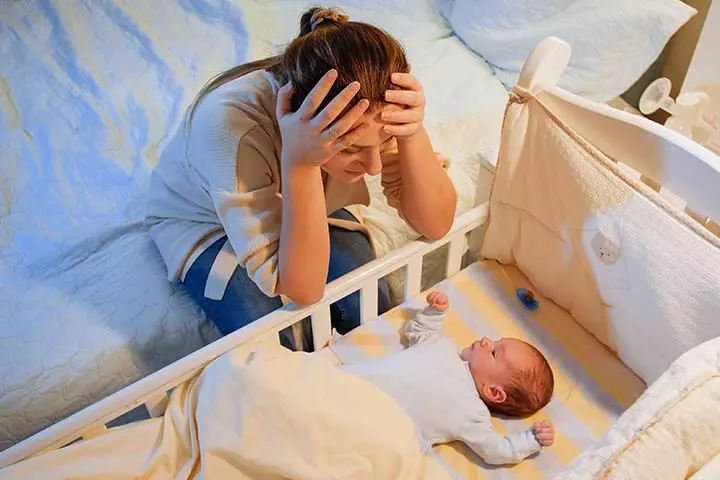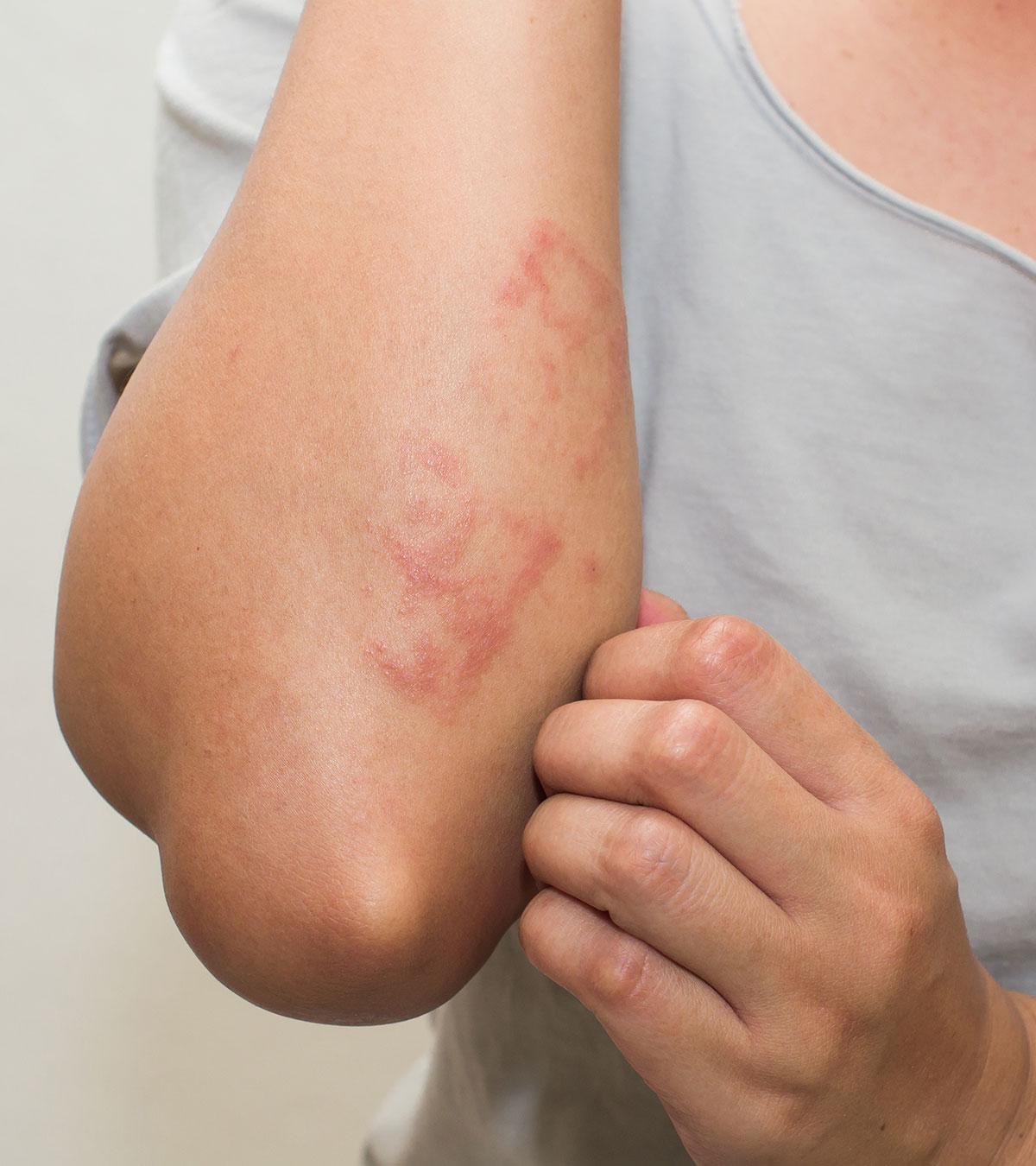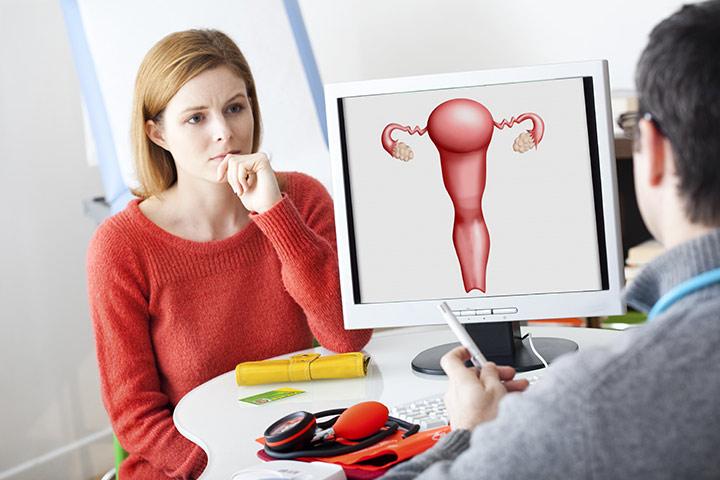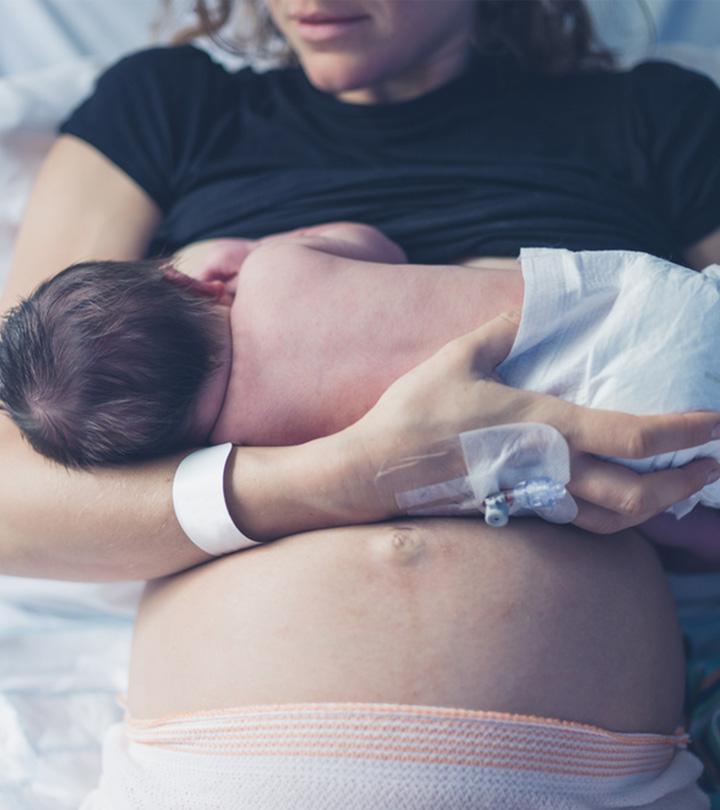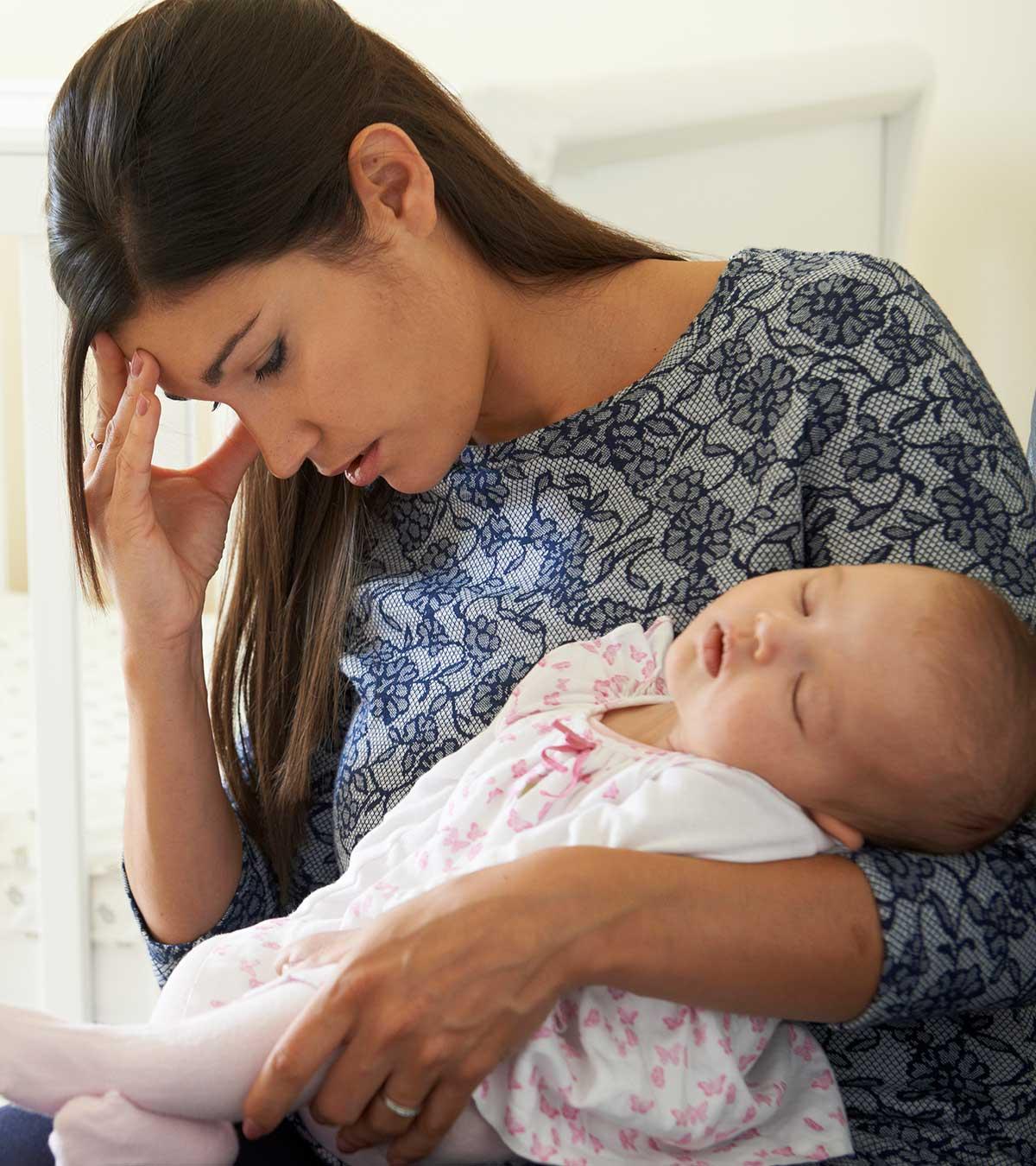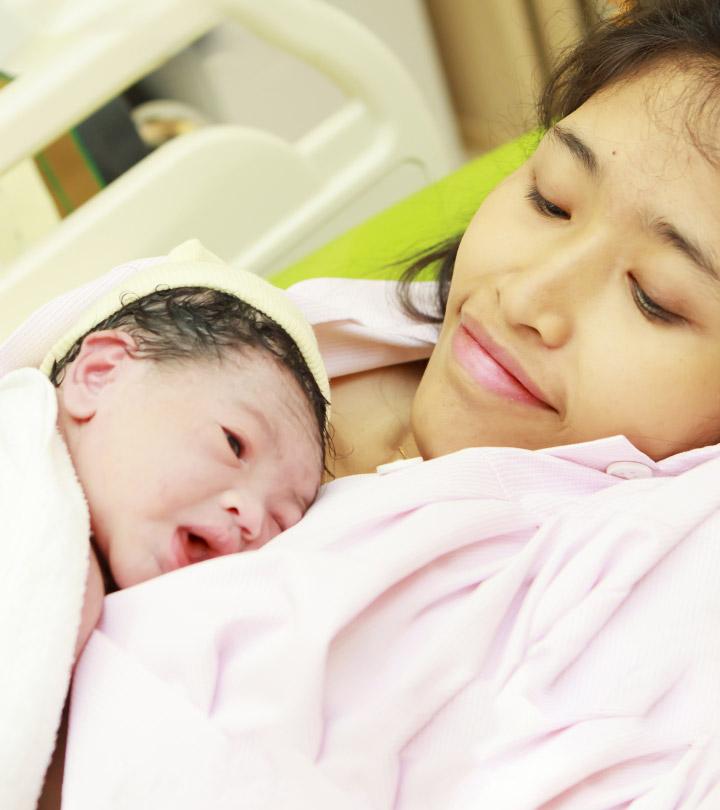
Image: Shutterstock
While the arrival of a baby is a considerably happy affair, some new mothers may exhibit signs of restlessness, frustration, and emotional withdrawal toward the little one. These signs could likely indicate postpartum depression, affecting the parents and the baby, unless appropriately addressed.
Although it is not uncommon for mothers to experience mood changes after delivery, PPD is more severe and has no one to blame for its onset. Give this post a read to understand what causes this condition, ways to identify it, treatment options, and tips to help the new mom enjoy her little bundle of joy.
What Is Postpartum Depression?
Postpartum depression (PPD) is an affective disorder characterized by sadness, worry, exhaustion, fear, and disinterest (1). While the term is often used interchangeably with baby blues and perinatal depressioniA major depressive episode characterized by extreme sadness during pregnancy , it differs slightly from both.
Baby blues or postpartum dysphoria is an acute form of depression characterized by mild symptoms of frustration, tiredness, tearful sadness, and being overwhelmed arising from hormonal changes during pregnancy. These symptoms appear within the first four days of childbirth, peak within the week, and disappear within about two weeks (2).
Postpartum depression, however, is when the symptoms of baby blues continue to intensify beyond two weeks, often impairing the mother from caring for herself and the baby. It can also occur as an extension of perinatal depression or depression during pregnancy, which is characterized by recurring episodes of depressive symptoms lasting throughout pregnancy and the first year of motherhood.
Image: IStock
 Quick fact
Quick factHow Common Is Postpartum Depression?
According to researchers using the ‘pregnancy risk assessment monitoring systemiA database system under the superintendence of the CDC for monitoring and addressing maternal and child health concerns ,’ postpartum depression occurs among one in every eight women, with an estimated incidence rate of seven to twenty percent (3). In addition, studies estimated that about 0.1 to 0.2 percent of mothers have an incidence of a severe form of postpartum depression with associated psychosis (4) (1). Stigma surrounding mental health issues, including postpartum depression, may contribute to underreporting of these conditions.
Which Populations Have A Greater Risk For PPD?
Research studies indicate that certain factors put women at risk for the onset of postpartum depression.
These risk factors include (3) (11):
- Family or personal history of depression (5)
- Birth complications requiring NICU care
- Separation from baby at birth
- Infant sleep, lactation, and crying problems (8)
- Complicated, multiple, or preterm pregnancies (4)
- Stressful or traumatic life events following pregnancy
- Hypertensive disorders of pregnancy (7)
- Lower-income and poor social support
- History of substance use and nicotine dependence (10)
 Point to consider
Point to considerWhat Are The Signs And Symptoms Of Postpartum Depression?
The following signs can be used to identify postpartum depression (4) (13).
- Lack of concentration at home or work
- Inability to stay organized
- Postpartum anxiety about the baby
- Feeling disconnected from the baby
- Recurring crying spells
- Disinterest towards previously enjoyable things
- Withdrawal from family and friends
- Feelings of self-doubt and guilt over being a caregiver
- Feelings of hopelessness, overwhelmingness, and helplessness
- Altered eating and sleeping patterns
Rachel, a mother of two, reveals that the pandemic situation and a traumatic birth might have been responsible for her postpartum depression. She shares how PPD manifested in her case. She says, “I was still having nightmares and intrusive flashbacks to the birth, and at my six week follow up my OB referred me to therapy, suspecting both PTSD and PPD… We were already on fairly rocky footing when Ian started going through the usual sleep regressions. I could feel whatever tiny reserves I had evaporate. I could hold it together during the day, mostly. But at night I fell apart. Adrian would fight her bedtime or Ian would throw up on me right after I’d showered and the rage I felt was all out of proportion. I wanted to cry or scream or quit. My anxiety would ramp up as evening approached, as I anticipated yet another sleepless night. At 3am frantically pacing the living room and attempting to get Ian to stop crying, hoping he wouldn’t wake the toddler or the neighbors (i)”
Image: IStock
What Causes Postpartum Depression?
The onset of postpartum depression has several interrelated causes that may have nothing to do with parental behavior. While research has been undertaken to understand the root cause, here are a few known factors that may be contributing to the problem.
1. Hormonal changes
While pregnancy is marked by profound hormonal changes, there is a marked drop in the levels of estrogen and progesterone just after delivery. This sudden change may trigger a rapid shift in a mother’s mood, making her feel unbalanced or overwhelmed (11). These postpartum hormones play a crucial role in regulating emotions and can affect a new mother’s mental health.
2. Exhaustion
Image: IStock
Sleep deprivation is a common issue that new mothers face, which can lead to physical discomfort and disarray in their thought process. In addition, they also experience worry and anxiety concerning the baby’s care and safety which may feel stressful to them. These feelings, along with their physical changes, may lead to exhaustion and lack of concentration (11). In a comprehensive meta-analysis involving multiple institutions, researchers discovered that poor sleep quality during pregnancy in women raises the risk of postpartum and perinatal depression by 2.71 times and 3.46 times, respectively.
3. History of anxiety and mood disorders
Some studies indicate that mothers with a history of anxiety or mood disorders are more likely to have an onset of postpartum depression than those without it. These studies also trace a link between cases with a family history of postpartum depression and its recent onset in a parent (12).
 Did you know?
Did you know?When To See A Doctor?
While most symptoms may gradually wane with adequate and timely assistance, PPD may turn worrisome in rare cases. A persistent or increasing intensity of symptoms, along with an onset of psychosis-like features, requires immediate medical attention. These features may include (13)
(14):
- Irritability and aggressive or disorganized behavior and speech
- Signs of hypervigilance, maniaiA mood disorder characterized by euphoria, impulsivity, and delusions , or hypomania
- Delusions (a belief that they are being controlled)
- Hallucinations (seeing or hearing things that others can’t)
- Paranoia or mistrust towards everyone (including the baby)
- Depersonalization (talking of self from a third-person perspective)
- Intrusive thoughts of harming others, self, or baby
Can Postpartum Depression Affect Your Baby?
Anecdotal studies on the effect of maternal postpartum depression indicate a few ways in which the newborn is affected. The child may experience (15) (16) (17):
- Poor parent-child bonding
- Behavioral problems
- Lack of medical attention
- Feeding and sleeping issues
- Developmental issues
- Higher risk of childhood obesity
- Impaired social skills
It’s important to note that these studies are not conclusive and further research is needed to fully understand the relationship between maternal depression and newborn care.
How Is Postpartum Depression Diagnosed?
The diagnosis of postpartum depression follows two predominant steps.
1. Psychological self-assessments
The clinician, specializing in obstetrics and gynecology, uses a self-assessment questionnaire such as the Edinburgh Postnatal Depression Scale with a checklist for the mother (17). The questions are designed to assess the onset and severity of the presenting symptoms and other essential parameters.
2. Reports from primary caregivers
A report is collected from the primary caregivers to understand the personal or medical history and the duration of the likely symptoms. The responses, in addition to these reports, help establish a diagnosis and determine the required treatment.
How Is Postpartum Depression Treated?
Image: IStock
The treatment for postpartum depression is similar to that of treating major depressive disorder while keeping the breastfeeding child in mind. Here are a few standard therapies for postpartum depression.
1. Cognitive behavior therapy (CBT)
Cognitive behavior therapy enables you to understand the thought processes underlying the current situation while attempting to change the associated negative behaviors. For example, CBT addresses parental self-doubt (such as ‘am I a good parent’), helplessness, and irritability. Furthermore, this therapy facilitates a change in the core beliefs surrounding the pregnancy and baby, increasing the mother-child bonding (11) (17).
2. Interpersonal therapy (IPT)
Interpersonal therapy aims to resolve interpersonal risk factors contributing to existing depressive symptoms. This form of treatment is a branch of family therapy that attempts to equip your family, peers, or other caregivers with the tools to assist you through postpartum depression. In addition, you are also prompted to participate and engage with family members and your baby (11). These interventions can help to improve family dynamics and enhance your overall well-being.
3. Self-care counseling
Self-care counseling aims at equipping you with the skills necessary to handle stress, get adequate rest and nutrition, exercise, and practice mindfulnessiA practiced state involving acute attention to present surroundings, emotions, and thought processes while caring for your baby. In addition, this therapy aims to increase your ability to recover from crying spells and worries, enhancing your emotional stability (13).
 Research finds
Research finds4. Antidepressant medications
Most forms of depression require antidepressants for symptom management, especially in cases with increasing severity.
A selective dosage of SSRIs (selective serotonin reuptake inhibitors) is prescribed to breastfeeding mothers as they indicate negligible side effects upon intake. A few of the common safe-to-use drugs include sertraline (Zoloft), paroxetine (Paxil), fluoxetine (Prozac), and citalopram (Celexa).
In addition, therapists prefer tricyclic antidepressants, such as imipramine (Tofranil) and nortriptyline (Pamelor), as a secondary alternative. However, they may cause side effects in the mother with rare traces in the breast milk (2) (17).
What If Postpartum Depression Remains Untreated?
Untreated postpartum depression may have a long-lasting impact on the mother’s life, leaving her exhausted, discontent, withdrawn, and indecisive.
It is also likely to cause low self-esteem and affect the mother’s ability to care for the child and herself, affecting the baby’s growth and development. In addition, the mother may also become more susceptible to substance use and intrusive thinking, which can lead to behaviors that may put self and others at risk (11) (17) (19).
Can Postpartum Depression Be Prevented?
There are a few measures that studies have proved as successful mitigators of high-intensity postpartum depression. A few ways for prevention, as suggested by these articles, include:
- PPD awareness
Educating parents about postpartum depression during pregnancy and after delivery paves the way for them to understand the condition in detail. In addition, it helps in early diagnosis and treatment (20).
- Social support
Social support could play a vital role in uplifting the mood and eliminating the symptoms through shared responsibility (20).
- Perinatal diet
Image: Shutterstock
You may refer to the diet chart for pregnant women and include higher quantities of omega-3 fatty acids and vitamin D in your diet to reduce the risk of postnatal depression (21).
Frequently Asked Questions
1. How long does postpartum depression last?
Postpartum depression can last two weeks to a year after delivery, with proper redressal. However, studies on women diagnosed with PPD showed that lack of timely intervention could lead to elevated depressive symptoms for three or more years after birth (22).
2. What is postpartum psychosis?
Postpartum psychosis is a rare and extended form of postpartum depression characterized by the onset of psychotic symptoms such as hallucinations, delusions, irrational or intrusive thinking, behavior, and paranoia (14).
3. Can men get postpartum depression?
Reports on depression suggest that even fathers can experience postpartum depression. For example, a pilot study using the ‘pregnancy risk assessment monitoring system for dads’ indicated that ten percent of fathers had experienced symptoms of depression after the birth of their babies. In addition, the condition is seen to be more severe in men who have a partner who is depressed (6) (23).
4. Can I have postpartum depression after a miscarriage?
Miscarriages are associated with clinical depression, affecting the mother’s psychological well-being. However, studies indicate that postpartum depression can occur in women who have had a healthy birth after a previous stillbirth or miscarriage (24).
5. Is it possible for fathers to experience postpartum depression?
Even fathers can go through postpartum depression. Statistics show that 7 – 9% of new fathers suffer from postpartum depression. Doubting their parenting skills is a common symptom. They tend to feel annoyed, furious, or be aggressive. Moreover, they may find it hard to appropriately assist their partners after giving birth and could discourage breastfeeding.
Most studies highlight dads, but partners of all genders can feel depressed before or after the baby’s birth. Thus, everyone needs to spot potential signs of depression in all partners (25).
Postpartum depression is an affective disorder in about seven to twenty percent of women. It is an extension of baby blues characterized by crying spells, worry, exhaustion, and disorganization. Women with a history of mood disorders, complicated or stressful pregnancies, babies with postnatal complications, lack of social support, and low economic status tend to be more prone to PPD. This condition may affect the mother and the baby, requiring timely intervention and adequate home care to resolve symptoms successfully.
Infographic: How To Help Someone With Postpartum Depression?
Postpartum depression can occur in any new parent. If you have noticed signs of depression in one of your loved ones and wish to help them, this infographic will help you with a few tips.
Illustration: Momjunction Design Team
Key Pointers
- Postpartum depression occurs when the symptoms of baby blues continue to intensify beyond two weeks.
- Hormonal changes, exhaustion, stress, and a history of depression can cause postpartum depression.
- PPD is characterized by low mood, anxiety, social withdrawal, disorganization, self-doubt, guilt, poor appetite, and sleeping problems.
- Adequate social support and timely intervention using cognitive behavior therapy, interpersonal therapy, and medications can reinstate normalcy.
Illustration: Postpartum Depression: Causes Symptoms Risks And Treatment
Image: Stable Diffusion/MomJunction Design Team
Are you feeling emotional, overwhelmed, anxious, and exhausted even after three weeks of delivery? These may be signs of postpartum depression. Learn more in this video and when to call a doctor.
Personal Experience: Source
MomJunction articles include first-hand experiences to provide you with better insights through real-life narratives. Here are the sources of personal accounts referenced in this article.
i. Postpartum depression during a pandemic.https://heart-of-light.blogspot.com/2021/02/postpartum-depression-during-pandemic.html
References
- Anca Daniela Stanescu et al.; (2018); Postpartum depression: Prevention and multimodal therapy.
https://scholar.valpo.edu/cgi/viewcontent.cgi?article=1139&context=jmms - Postpartum depression.
https://www.monash.edu/medicine/her-centre/education/resources/postpartum-depression - Alhusen and Alvarez; (2016); Perinatal depression.
https://www.ncbi.nlm.nih.gov/pmc/articles/PMC4841178/ - Depression Among Women.
https://www.cdc.gov/reproductivehealth/depression/index.htm - Beyond Baby Blues: Postpartum Depression.
https://www.cedars-sinai.org/blog/postpartum-depression.html - Escribà-Agüir and Artazcoz;(2011); Gender differences in postpartum depression: a longitudinal cohort study.
https://www.ncbi.nlm.nih.gov/pmc/articles/PMC3069755/ - Márcia R Strapasson et al.; (2018); Associations between postpartum depression and hypertensive disorders of pregnancy.
https://pubmed.ncbi.nlm.nih.gov/30194695/ - Harriet Hiscock et al.; (2014); Preventing Early Infant Sleep and Crying Problems and Postnatal Depression: A Randomized Trial.
https://publications.aap.org/pediatrics/article-abstract/133/2/e346/30892/Preventing-Early-Infant-Sleep-and-Crying-Problems - Full Report of the Prevalence
Incidence - Christie A Lancaster et al.; (2010); Risk factors for depressive symptoms during pregnancy: a systematic review.
https://pubmed.ncbi.nlm.nih.gov/20096252/ - Postpartum Depression Facts.
https://www.med.unc.edu/ncmatters/wp-content/uploads/sites/1000/2019/12/postpartum-depression-brochure_146657.pdf - Baby Blues and Postpartum Depression: Mood Disorders and Pregnancy.
https://www.hopkinsmedicine.org/health/wellness-and-prevention/postpartum-mood-disorders-what-new-moms-need-to-know - Postpartum Depression.
https://kidshealth.org/en/parents/ppd.html - Postpartum Psychosis.
https://my.clevelandclinic.org/health/diseases/24152-postpartum-psychosis - Pamela J Surkan et al.; (2014); Early maternal depressive symptoms and child growth trajectories: a longitudinal analysis of a nationally representative US birth cohort.
https://pubmed.ncbi.nlm.nih.gov/25047367/ - Pree M Benton; (2015); Does maternal psychopathology increase the risk of pre-schooler obesity? A systematic review.
https://pubmed.ncbi.nlm.nih.gov/25572134/ - Postpartum Depression.
https://my.clevelandclinic.org/health/diseases/9312-postpartum-depression - Ariadna Forray and Robert B Ostroff; (2007); The use of electroconvulsive therapy in postpartum affective disorders.
https://pubmed.ncbi.nlm.nih.gov/17804998/ - The Devastating Impact Of Untreated Postpartum Depression.
http://healthcare.utah.edu/healthfeed/postings/2022/10/postpartum-depression - What is the Importance of Education Women on Postpartum Depression?
https://sophia.stkate.edu/cgi/viewcontent.cgi?article=1421&context=msw_papers - The Effects of Perinatal Nutrition in the Prevention of Postpartum Depression.
https://www.health.harvard.edu/blog/preventing-depression-in-pregnancy-new-guidelines-2019032616263 - Diane L Putnick et al.; (2020); Trajectories of Maternal Postpartum Depressive Symptoms.
https://pubmed.ncbi.nlm.nih.gov/33109744/ - Craig F Garfield et al.; (2022); Pregnancy Risk Assessment Monitoring System for Dads: A piloted randomized trial of public health surveillance of recent fathers’ behaviors before and after infant birth.
https://pubmed.ncbi.nlm.nih.gov/35061783/ - Blackmore et al.; (2011); Previous prenatal loss as a predictor of perinatal depression and anxiety.
https://pubmed.ncbi.nlm.nih.gov/21372060/ - Perinatal Depression in Partners: Can Both Parents Get the “Baby Blues?”
https://www.healthychildren.org/English/ages-stages/prenatal/delivery-beyond/Pages/dads-can-get-postpartum-depression-too.aspx
Community Experiences
Join the conversation and become a part of our nurturing community! Share your stories, experiences, and insights to connect with fellow parents.
Read full bio of Dr. Holly Schiff
Read full bio of Rebecca Malachi
Read full bio of Reshmi Das





